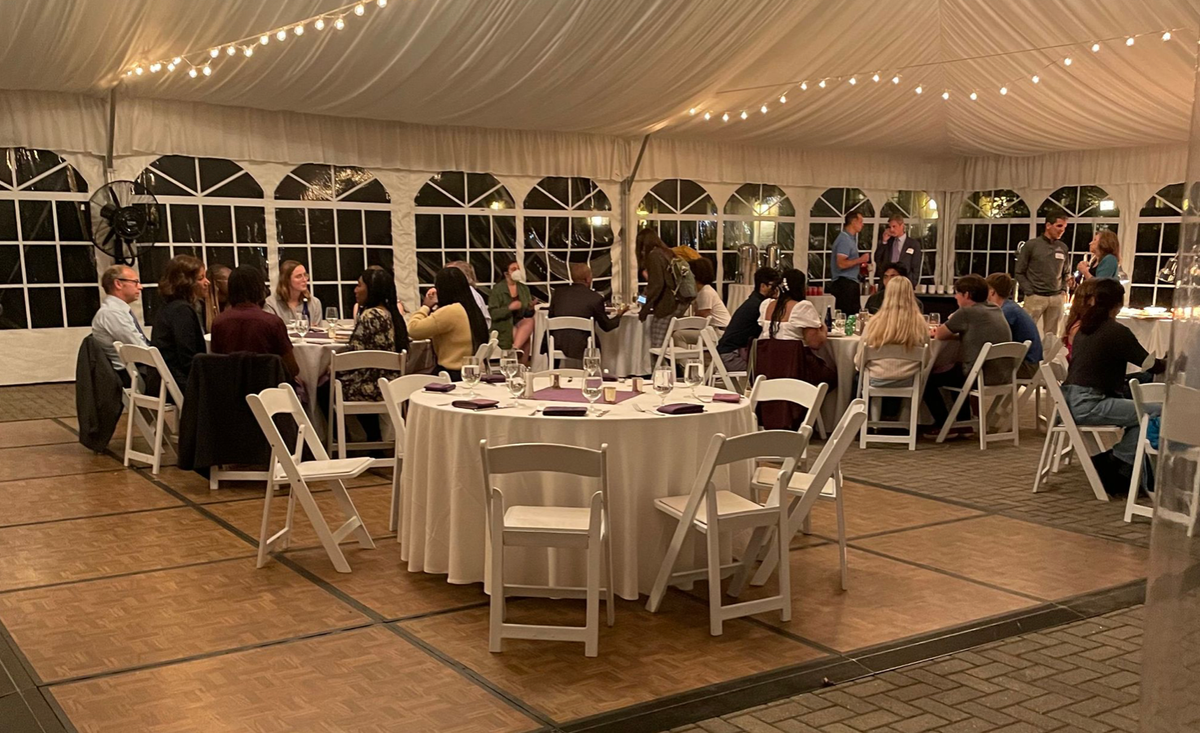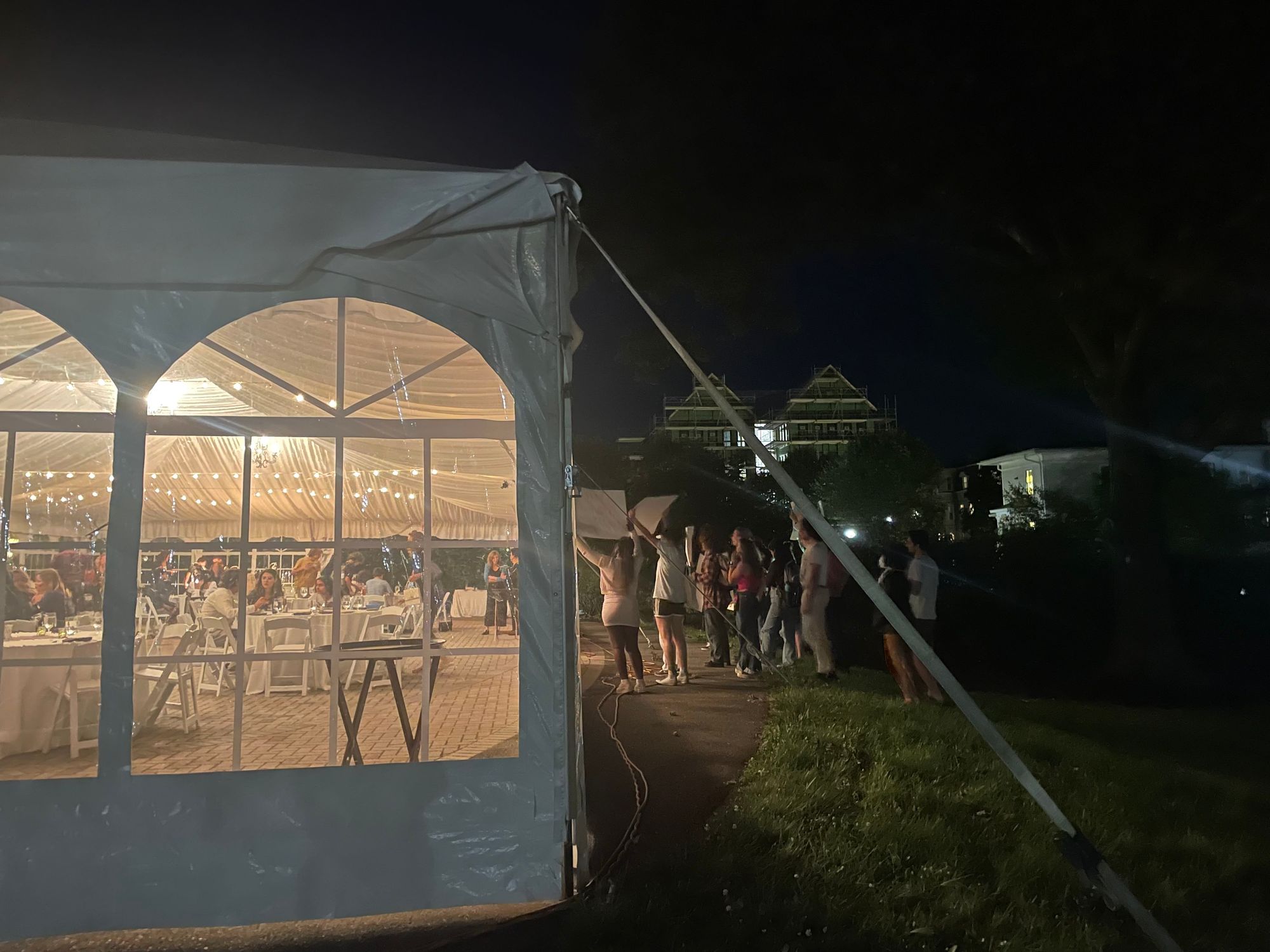Amherst Labor Alliance Stages Protest at Trustee Dinner
Just over a dozen members of the Amherst Labor Alliance gathered on Thursday, Sept. 8, to protest staff working conditions at a “Pizza with the Trustees” event behind the Inn at Boltwood, which hosted board members, President Michael Elliott, and specially-invited students.

The Amherst Labor Alliance (ALA) staged a protest at a “Pizza with Trustees” event at the Inn at Boltwood on Thursday Sept. 8, disrupting the dinner and demanding better pay and working conditions for Amherst staff members.
The event, which was attended by President Michael Elliott and chair of the board Andy Nussbaum ’85, was designed to allow specially-invited members of the student body to share their experiences with a group of trustees. Most of the protestors did not receive invites, but they were eventually invited to sit down with the board members to share their complaints.
The protest began when members of the ALA walked towards the tent, brandishing hand-drawn signs and chanting, “Raise the wages! It's on you!” Conversations inside the tent dropped to an awkward hum.
After several more minutes of chanting by the ALA, Caden Stockwell ’25 gave a fiery speech condemning the treatment of Amherst staff members and denouncing the business practices of individual board members. Protestors then spoke with Elliott, before eventually joining the trustees inside the tent to air their concerns.
As protestors joined the dinner, the confrontational atmosphere dissolved into the murmurs of conversation and ice clinking on glass.

Thursday’s protest was not the first time that ALA — which was founded just last fall — has disrupted a major campus event and put the college’s leadership in an awkward position. They displayed banners calling for action during the 2021 homecoming football game and the 2022 City Streets festival — occasions when guests of note, such as the board, alumni, and admitted students were visiting campus.
However, the protest at the Boltwood represented an escalation in ALA’s tactics — the first time they directly confronted members of the board.
According to member Angel Musyimi ’23, the ALA demands that the college raise staff wages, end the practice of denying “casual” employees various benefits, and eliminate the “toxic” work environment in Val that includes “people being yelled at by supervisors and written up for small infractions.”
In response to the ALA’s protest, Chief Communication Officer Sandy Genelius pointed to a number of steps the administration has taken to support workers across the last year, including converting many “casual” positions into full time roles, introducing salary increases for multiple subsets of the workforce, and a 5 percent increase in pay for all employees on July 1 (a month when inflation hit 8.3 percent).
Musyimi, however, maintained that these steps were, in many ways, insufficient, and that the wages paid to Val staff were “not enough to live on, especially if you have a family.”
Thursday’s protest also marked the first time that Elliott, who has been in office for less than two months, has had to directly confront campus activism.
After the protestors spoke, he stepped outside to speak with them.
Musyimi said that Elliott’s main goal seemed to be to stop the protest and to recast the discussion on “his terms,” avoiding confrontation by offering to meet the protestors at a later date.
Elliott struck a different tone in a statement to The Student, writing that “the arrival of the Labor Alliance was in keeping with the spirit of the event,” which was “designed to offer trustees and students the chance to speak with one another.”
Musyimi pushed back on the idea that the protest was the kind of dialogue that the administration had in mind, pointing to the fact that only a select group of 125 students, which seemed to include CAs and some leaders of campus organizations, received invitations to the event. There was no information about it sent out via the Daily Mammoth or posted on the Amherst website.
Eventually, pointing to the fact that the event was intended for students to share their experiences with the board, Musyimi convinced Elliott to let the group inside the tent to engage the board members in conversation.
This was the ALA’s ultimate goal — Musyimi said that past conversations with former President Biddy Martin did not yield sufficient results, and that Martin told them that any further changes would have to come from the Board of Trustees.
Once inside, protestors were met with varying reactions from board members. Some seemed sympathetic to their cause, Musyimi said. She also said that many seemed uninformed about the labor issue on campus and surprised by the protest.
One trustee argued that large wage increases were not economically feasible for the college, while another claimed that specific labor concerns were generally outside their purview as trustees. Yet another guaranteed to the protestors that the labor issue would be brought up in the board’s meeting the following day.
Musyimi said that the board members were not as responsive as the ALA would have liked. She would have liked to have established a direct line of communication to the Board of Trustees. At this point, there is no mechanism by which the ALA could more formally bring their complaints before the board or otherwise impact its proceedings.
Though trustees were not as responsive as she would have liked, Musyimi made clear that the ALA will continue to be active on campus until its concerns are met.





Comments ()